| Srl | Item |
| 1 |
ID:
149692
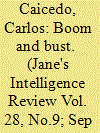

|
|
|
|
|
| Summary/Abstract |
Brazil is reeling from the combined impact of a high-profile corruption scandal, political instability, and a downturn in its economy. Carlos Caicedo sets out three scenarios for the country's political outlook over the next two years and the likely security impacts.
|
|
|
|
|
|
|
|
|
|
|
|
|
|
|
|
| 2 |
ID:
179769
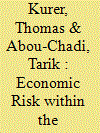

|
|
|
|
|
| Summary/Abstract |
This article investigates how unemployment risk within households affects voting for the radical right. The authors contribute to recent advances in the literature that have highlighted the role of economic threat for understanding the support of radical-right parties. In contrast to existing work, the authors do not treat voters as atomistic individuals; they instead investigate households as a crucial site of preference formation. Combining largescale labor market data with comparative survey data, they confirm the expectations of their theoretical framework by demonstrating that the effect of occupational unemployment risk on radical-right support is strongly conditioned by household-risk constellations. Voting for the radical right is a function not only of a voter’s own risk, but also of his or her partner’s risk. The article provides additional evidence on the extent to which these effects are gendered and on the mechanisms that link household risk and party choice. The results imply that much of the existing literature on individual risk exposure potentially underestimates its effect on political behavior due to the neglect of multiplier effects within households.
|
|
|
|
|
|
|
|
|
|
|
|
|
|
|
|
| 3 |
ID:
187641
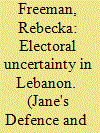

|
|
|
| 4 |
ID:
086785


|
|
|
|
|
| Publication |
2009.
|
| Summary/Abstract |
Ecuador will hold elections on 26 April, not just for the presidency and the legislature but also for provincial and municipal governments. Having overhauled the country's constitution in 2008, President Rafael Correa Delgado hopes to win re-election. With the opposition weak and divided, Correa is likely to achieve this aim, having managed to concentrate power in his hands in ways that no Ecuadorian president has in the past 30 years.
|
|
|
|
|
|
|
|
|
|
|
|
|
|
|
|
| 5 |
ID:
151791
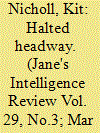

|
|
|
| 6 |
ID:
187729
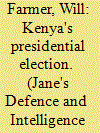

|
|
|
| 7 |
ID:
086095
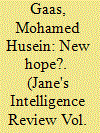

|
|
|
| 8 |
ID:
156016
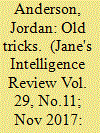

|
|
|
| 9 |
ID:
149822
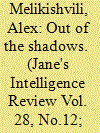

|
|
|
|
|
| Summary/Abstract |
Uzbekistan is showing signs of easing the repression exercised by late president Islam Karimov. Alex Melikishvili analyses the extent to which the country will move away from its post-Soviet isolation and embrace reform, as well as improve external relations.
|
|
|
|
|
|
|
|
|
|
|
|
|
|
|
|
| 10 |
ID:
134030
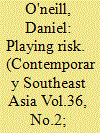

|
|
|
|
|
| Publication |
2014.
|
| Summary/Abstract |
Weak rule of law, corruption and political risk are factors found to deter foreign direct investment (FDI) and all are characteristics of Cambodia's investment environment. Yet Chinese outward FDI has been found to contradict these general trends, as illustrated by high levels of Chinese investment in Cambodia. This article analyses how Chinese firms are able to successfully invest in Cambodia and finds that variation in ownership type (state owned or private), investment size and the degree of mobility of the assets invested determine the Chinese investor's strategy. For China's state owned enterprises (SOEs) in the hydropower sector, Chinese government support in the form of aid and loans to the government of Cambodia secures approval and protection for investments. Private Chinese firms with smaller and more mobile investments in Cambodia's garment industry, on the other hand, rely on industry-wide collective action facilitated by cultural and linguistic ties both to other ethnically Chinese foreign investors and to Chinese Cambodians in the industry. Finally, in the land and resource sector, Chinese firms secure a politically connected local stakeholder to gain approval and protection for large investments.
|
|
|
|
|
|
|
|
|
|
|
|
|
|
|
|
| 11 |
ID:
130049
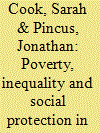

|
|
|
|
|
| Publication |
2014.
|
| Summary/Abstract |
Social protection programmes have expanded rapidly in the developing world in recent years. In Southeast Asia, the experience of the Asian Financial Crisis of the 1990s heightened awareness of vulnerability to poverty and the role of government in protecting households from a sudden loss of employment and income, or from contingencies such as ill-health and ageing. Most governments have expanded targeted social assistance programmes, although the quality and coverage of these programmes vary from place to place. Public support for basic health and education services is also uneven. Common challenges in the region include economic risks associated with financial globalization, rapid urbanization, high levels of informal employment, rising dependency ratios and a highly unequal gender division of labour.
|
|
|
|
|
|
|
|
|
|
|
|
|
|
|
|
| 12 |
ID:
157431


|
|
|
| 13 |
ID:
157442
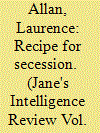

|
|
|
| 14 |
ID:
149849
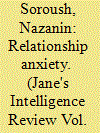

|
|
|
|
|
| Summary/Abstract |
The election of Donald Trump as US president has increased risks for the future of the JCPOA nuclear agreement with Iran, In the wake of the election, Nazanin Soroush examines the likely outlook for the agreement in the context of Iranian domestic politics.
|
|
|
|
|
|
|
|
|
|
|
|
|
|
|
|
| 15 |
ID:
132048
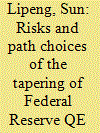

|
|
|
|
|
| Publication |
2014.
|
| Summary/Abstract |
On December 2013, the Federal Open Market Committee (FOMC) formally announced that it would wind down the size of its large-scale asset purchase program. This formally set in motion the exit of quantitative easing (QE). However, at present, the American unemployment rate is still relatively high, the real estate market is gloomy, in?ation is too low, the balance sheet is facing an unexpected increase in risks, and policies are confronted with cost pressures. Under such circumstances, the Fed is faced with multiple challenges in the tapering of QE. QB policy has made great contributions to helping the United States to shake off ?nancial crisis, and the safe and smooth exit of the policy is of the utmost importance to the recovery of the U.S. economy and the reshaping of U.S. advantages. In addition, the Fed 's monetary policy reversal will engender spillover risks and challenges for China 's economy.
|
|
|
|
|
|
|
|
|
|
|
|
|
|
|
|
| 16 |
ID:
152689


|
|
|
| 17 |
ID:
142393
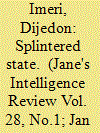

|
|
|
| 18 |
ID:
088106
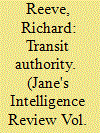

|
|
|
|
|
| Publication |
2009.
|
| Summary/Abstract |
Three months after seizing power in an anti-establishment coup, Guinea's military junta announced a timetable for turning the country into a democracy.
|
|
|
|
|
|
|
|
|
|
|
|
|
|
|
|
| 19 |
ID:
131501
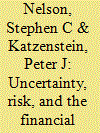

|
|
|
|
|
| Publication |
2014.
|
| Summary/Abstract |
The distinction between uncertainty and risk, originally drawn by Frank Knight and John Maynard Keynes in the 1920s, remains fundamentally important today. In the presence of uncertainty, market actors and economic policy-makers substitute other methods of decision making for rational calculation-specifically, actors' decisions are rooted in social conventions. Drawing from innovations in financial markets and deliberations among top American monetary authorities in the years before the 2008 crisis, we show how economic actors and policy-makers live in worlds of risk and uncertainty. In that world social conventions deserve much greater attention than conventional IPE analyses accords them. Such conventions must be part of our toolkit as we seek to understand the preferences and strategies of economic and political actors.
|
|
|
|
|
|
|
|
|
|
|
|
|
|
|
|